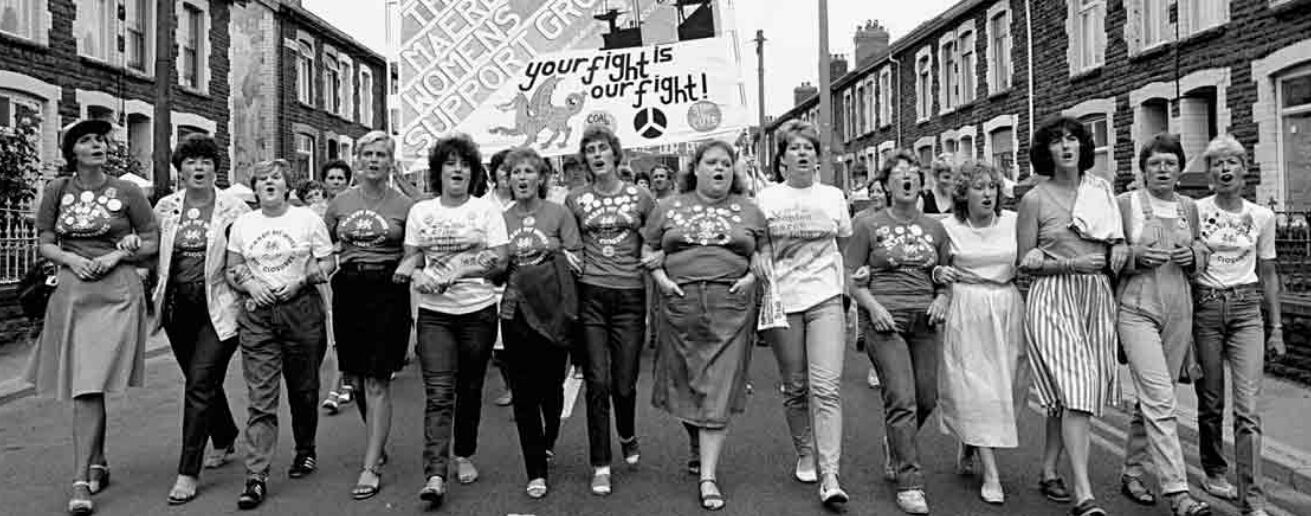If you remember the miner’s strike of 1984-5, you’ll remember the division, hatred and rebellion inspired in the working classes by the conservative government. In Tinned Good’s, Fiona Whitelaw’s character Sue proclaims, “This government is trying to starve us into submission.” Nowadays, many may think this kind of treatment from those in power is unthinkable, unheard of, cruel and something that might be expected of a policed state. But it happened just 30 years ago.
While bloodshed and violence appeared across the news for Britain to gawp at, the people of northern mining communities had to deal with those casualties in real life. Families of striking miners lived off food banks, soup kitchens, and donations—but never charity. Those who chose to keep working, to still earn a living, earned themselves the name ‘scab’, and were often cut off from society, looked down on and ridiculed. Of many things, it’s arguable that the ’84 strikes were some of the working class’s proudest moments: so proud, it near killed thousands. But despite the division, people were united in the strength of their grief; women pulled together to petition and picket, scrounge food, clothes and essentials to keep the homes going, and raise money for buses down to London to tell Maggie exactly what she was doing wrong.
Set between the collective kitchens of these brave women, to picket lines and police stations, Tinned Goods tell the story of the tumultuous journey to find their voice, save their relationships, their families and their lives. Between the all-female cast of five, a powerful image is painted of life on a front line where women did the fighting. The play is well acted, directed and clever use of set and song between scenes make for a very tactile performance. My only criticism would be that many scenes and much of the dialogue is set on one very high, very loud level; true, this illustrates clearly the desperation and frustration of the times, as well as a committed characterisation of the people being portrayed, but occasionally I felt that key moments could have been more effective with better use of pause and powerful silence. Obviously this doesn’t apply to scenes of protest and picketing- these are full of life and energy just as they should be, and are as striking and lasting as they are illuminating.
The show includes a brilliant cast of actors, notably Caroline Frewin for her incredible and seamless transformation from scared and confused miner’s wife to angry and insolent striking husband. While it’s true that many women can play men effectively on stage, it still doesn’t happen all that often. More than just clever costume choices and minimal make up, Frewin’s performance in both roles is to be highly commended.
Laura M Tipper, playing spirited Bethany, was impossible not to watch; in an infectiously naughty, funny and relatable role, Tipper is committed to the performance from the start right to the end. Even a slight false start as the second half began, just as one theatre goer marched, drink in hand, back to his seat as the stage lights came up, didn’t cause her to falter in her emotive and energetic performance. Every woman who remembers being 16 can probably relate to the excitement and confusion of first romances, especially those which we felt had to be hid from our parents. But it must have been a whole other world, trying to get away with having a boyfriend in the middle of a violent, political class war, where everyone’s feeling the pressure of being well and truly skint.
I’ve a feeling I’ve seen Jade Samuels in something else very recently, or at least her characterisation of a loyal-till-the-end best friend, one who will laugh with you and at you with equal devotion, makes me feel as if I’ve known her years. (I haven’t.) Displaying amongst other skills, a mastery of accents, it’s hard not to smile at her performance.
Jenny Stokes plays Aunty Brenda- a comforting character a lot of us grew up with: not exactly a parent, so therefore not a disciplinarian, but safe and one to confide in. When Bethany needs to tell someone about her secret courtship, Brenda is of course this person and she of course gently encourages her to ‘do the right thing.’ She is also an immensely strong character, leading the women marching and settling disputes among the ranks. Stokes’ performance is very believable and somehow calming to watch—perhaps because when Brenda’s on your side, you’re so well reassured that everything’s going to be alright.
Finally Fiona Whitelaw plays feisty Sue, Brenda’s right hand, Bethany’s mum and wife to an insolent, arrogant, nameless husband. Whitelaw delivers an emotional performance to which general audience reaction was of nostalgia: “My mum used to do that too, give the kids all the chicken and just have bread and gravy herself” recalled one theatre goer. Another commented on the hardship wives and mothers go through, not only back in ’84 but today too: balancing doing what’s best for the family and pouring energy into a cause close to the heart can be tough, and Whitelaw definitely stirred empathy as people recognised a truthful performance.
Reviewer: Natalie Romero
Reviewed: 2nd April 2016

